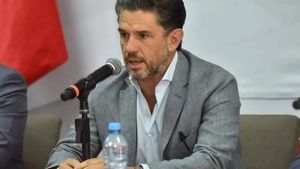In a significant turn of events, the Provincial Court of Madrid has provisionally shelved the investigation against renowned producer Nacho Cano and his collaborators concerning allegations of labor rights violations and illegal immigration. The case arose from claims that Cano had brought approximately 20 Mexican scholarship holders to Spain for his musical show, Malinche, without proper work contracts or adequate remuneration.
The court's decision, announced on April 25, 2025, came after Cano's legal team appealed against the initial findings of the investigating judge, Inmaculada Iglesias. The judges ruled that there was insufficient evidence to support the accusations, stating that the alleged scholarship holders were not clandestinely introduced into Spain but followed a common procedure of entering as tourists without a visa and subsequently applying for student visas once in the country.
According to the court's ruling, "the investigated have not tried to introduce Mexican citizens clandestinely with an alleged entry as tourists with the intention of remaining in Spain in violation of immigration regulations." This statement directly contradicts the earlier claims that the scholarship holders had been instructed to pose as tourists upon arriving in Spain, a point raised by the police evidence and testimonies from the dancers.
The court's president, Isabel Díaz Ayuso, a personal friend and supporter of Cano, praised the decision, calling it a victory against what she described as censorship and political persecution. "Nacho Cano is a brave man who has faced justice and won. This is a serious issue that the cultural world and all of Spain should take note of," she stated.
Cano has consistently maintained that he was a victim of a politically motivated attack due to his friendship with Ayuso, asserting that the entire case was orchestrated to discredit him. Following the court's ruling, he expressed his intention to file a lawsuit against Judge Iglesias, claiming her actions were unjust and politically motivated.
The investigation initially began in July 2024 after a complaint from Lesly Ochoa, one of the scholarship holders involved. The complaint alleged that Cano had exploited these young Mexicans by employing them without proper contracts, thus violating labor and immigration laws. The accusations included claims that the scholarship holders performed tasks typical of employees, leading to suspicions of labor exploitation.
However, the court found that the process followed by Cano and his team was not unusual, as it is common practice for individuals to enter Spain as tourists and then apply for student visas. The judges noted that while the students' visas were ultimately denied, this was not due to any illegal entry but rather because they failed to prove that the training they were to receive at the Jana international school was regulated or approved.
The court also validated a second report from the Madrid Labor Inspectorate, which supported the findings of the first report, indicating that the scholarship holders were not employees of Cano's production company. The inspectorate concluded that there was no evidence of a hidden employment relationship, and the scholarships were intended for artistic training and cultural exchange.
Addressing the lengthy rehearsal hours and participation of the scholarship holders in the show, the judges acknowledged that while their schedules may have differed from the norm, this was not unusual for a musical production. They emphasized that the participants were not being exploited but were instead gaining valuable experience.
In terms of compensation, the scholarship holders initially received 300 euros per month, which later increased to 500 euros. The court clarified that these payments did not equate to salaries typical of workers, as the young people were there primarily for training purposes.
Despite the court's ruling, the case has sparked significant controversy, with political figures and the media closely following the developments. Minister of Transport Óscar Puente was quick to distance himself from the controversy, withdrawing Renfe's sponsorship from Malinche shortly after Cano's arrest, which many viewed as a politically motivated decision.
In light of the court's findings, Cano's legal team may seek to hold the government accountable for damages related to the sponsorship withdrawal. The situation raises questions about the intersection of politics and the arts in Spain, particularly regarding how public figures are treated in the legal system.
As the dust settles on this high-profile case, it remains to be seen how it will impact Cano's career and the broader cultural landscape in Spain. The outcome has reignited discussions about labor rights, immigration policies, and the treatment of artists within the political sphere.
In summary, the Provincial Court's decision marks a pivotal moment for Nacho Cano, who has faced considerable scrutiny over the past year. With the investigation now shelved, Cano looks to move forward, but the implications of this case will likely continue to resonate in the cultural and political arenas of Spain.






